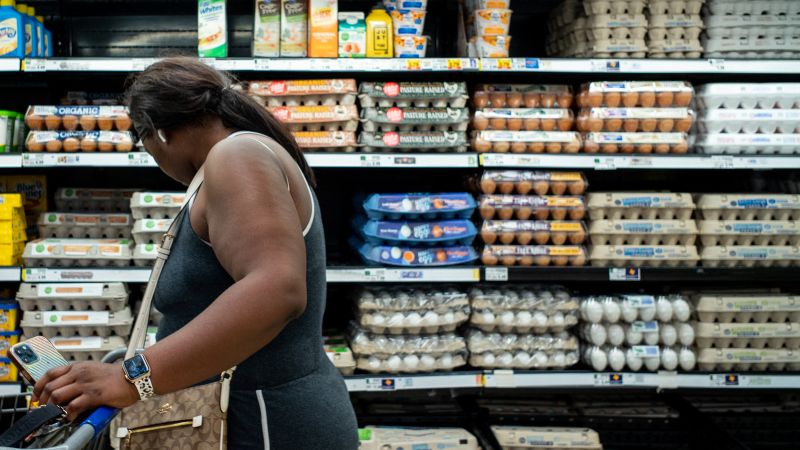A version of this story appears in CNN’s What Matters newsletter. To get it in your inbox, sign up here.
CNN
—
Earlier in December, CNN’s Christine Romans wrote about the “yes, but” economy.
“Yes, the economy is strong,” she said. “But it comes with a lot of caveats.”
Here’s a riff on that for this week: There’s some good news to report, but questions and caveats are looming in the future.
Well, maybe it’s more accurate to say inflation’s not boiling quite as much. CNN’s Alicia Wallace wrote Tuesday that the Consumer Price Index showed inflation slowing more than many economists expected.
“Prices rose 7.1% annually in November, down from 7.7% in October, according to the Bureau of Labor Statistics’ closely watched index, which measures the change in prices paid by consumers for goods and services,” she wrote.
That means inflation has been slowing for five straight months and is down from this year’s peak of 9.1% in June.
Energy prices in particular are down. It’s cheaper to buy gas today than it was a year ago.
The Federal Reserve announced it would hike interest rates another half of a percentage point on Wednesday and that it would not consider inflation to be tamed until it falls to a sustained 2% in a different index, the Personal Consumption Expenditures.
That means the Fed is still rooting for somewhat higher unemployment rates and slowing the economy.
Stocks, which had risen on the “inflation is cooling” news Tuesday, were down Wednesday on the “Fed is not convinced” development.
Federal Reserve Chair Jerome Powell made clear Wednesday that more interest rate hikes are on the way in 2023.
“We still have some ways to go,” he said.
And he further predicted there would be no rate cuts in 2023.
“Historical experience cautions strongly against prematurely loosening policy. I wouldn’t say we’re considering rate cuts.”
Read CNN’s updates about the Fed news from throughout the day.
The Fed made clear that rate hikes are working to slow the economy – more than it anticipated.
“After raising rates to the highest level in 15 years, the Fed said Wednesday it forecast US gross domestic product, the broadest measure of America’s economy, to grow just half a percentage point in 2023,” writes CNN’s David Goldman.
“In its previous forecast in September, Fed economists thought the economy would expand by 1.2%. Joblessness will grow next year too, Fed officials forecast, with the unemployment rate rising to 4.6% by the end of 2023, up from the current rate of 3.7%.”
Goldman notes that the Fed argues an economic slowdown caused by its rate hikes isn’t technically a recession.
“The semantics of whether or not America is in a technical recession or not may not matter – especially to people who lose their job or companies whose profits are squeezed,” he writes.
The Fed will be cautious because they so badly underestimated inflation earlier this year, according to Diane Swonk, chief economist at KPMG.
“They’re really cognizant they’ve been humbled more than once by inflation reaccelerating for longer than they thought,” she said on CNN just before Wednesday’s rate hike was announced. “They don’t want to allow the underlying inflation to metastasize.”
News that negotiators on the Hill have reached the framework of an agreement to fund the government for a full year is welcomed since it will delay a brewing fight over spending.
There’s still a lot to learn about this framework of a deal, including what’s inside.
CNN’s Lauren Fox writes that even House Republicans might be happy about this development. GOP leader Kevin McCarthy is trying to find the votes to become speaker, and adding a spending fight to his plate would get messy quickly.
“Republicans – even leaders such as McCarthy – knew that clearing the deck now would make the first months of their House majority far easier to contend with,” Fox writes. “Democrats wanted to act now while they had control of the House, Senate and White House and they had maximum power over negotiations.” Read more of Fox’s report.
None of the disagreements over spending are going away. McCarthy will have to take a hard-line stance to placate conservative Republicans, and there is an expectation that the GOP will use the debt ceiling, and the threat of a US government default, to force Democrats to agree to spending cuts next year.
At some point, perceptions of a bad economy can become reality. If and when the debt fight starts to shake confidence in the credit of the US government, that’s the kind of thing that can reverberate into the economy.
The difference between 7.1% month-over-month inflation and 7.7% inflation in October may not feel like much on the micro level to Americans who are paying 49% more for eggs this year than they were last year.
RELATED: What rising interest rates mean for you
Inflation was the most important issue of the most recent election. More voters – 31% – said inflation was the most important issue to their vote than any other, according to exit polls. It’s because of inflation that Republicans will control the House come January 3.
CNN’s Julia Horowitz writes Wednesday that the Fed’s mantra of seeking 2% inflation might be unattainable in an economy where supply chain issues persist, the worker population is aging and climate change is a wild card.
“The decade after the financial crisis, they were fighting hard to get inflation up,” Mark Zandi, chief economist of Moody’s Analytics, says in her story. “In the coming decade, they’re going to be fighting hard to get inflation down.”
In the meantime, cooling inflation might be praised by policymakers, but it could rub everyone else the wrong way, especially if an economic slowdown starts to feel like a recession. That’s the kind of perception that can continue to move elections.







More Stories
Google restructures finance team as part of AI shift, CFO tells employees in memo
Tech Leads Stocks Higher as Investors Mull Mixed Inflation Data
California minimum-wage mandate causes maximum damage